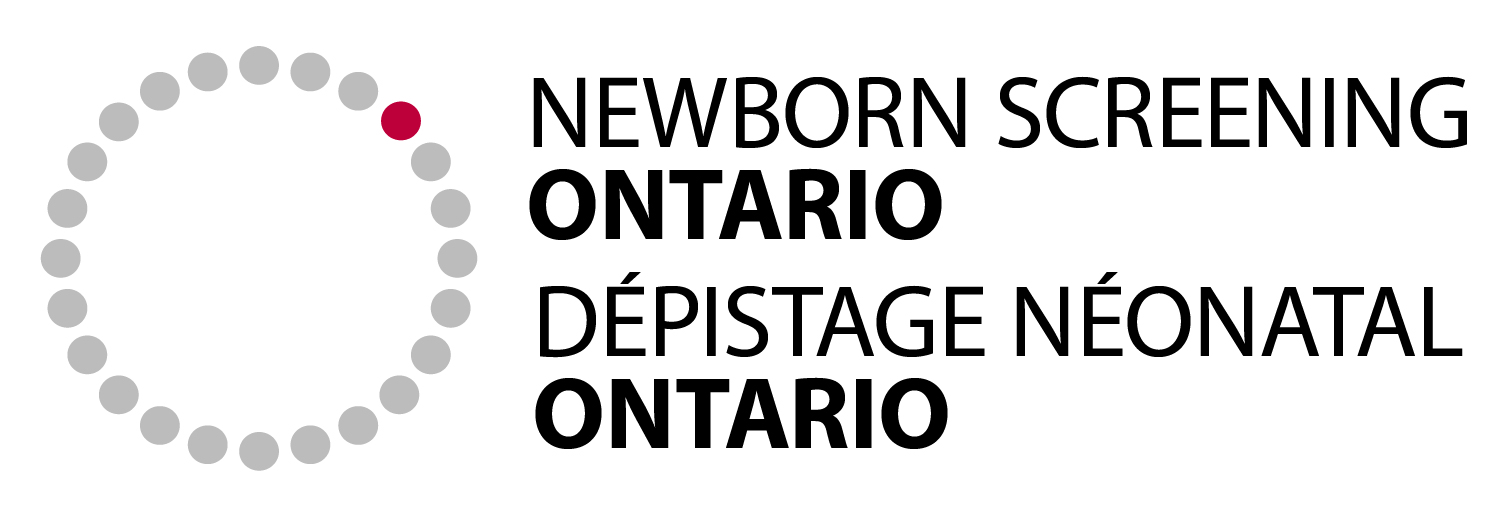- In Ontario, a heel prick is used to take a few drops of blood from each baby shortly after birth. The blood is tested for more than 25 treatable diseases, including PKU.
- A screen positive result means that more tests are needed to know whether or not a baby has PKU. It does not mean that a baby has PKU. Babies identified at a young age through screening can be treated early to help prevent health problems.
Phenylketonuria (PKU)
At a glance
| Approximate incidence in Ontario: | Marker measured: | Screening can prevent: | Treatment: |
| 1 in 12,000 | Phenylalanine | Severe and irreversible developmental delay | Phenylalanine restricted diet, supplementation |
PKU is a rare inherited (genetic) disease.
- Babies with PKU can not break down a building block of protein (called an amino acid) called phenylalanine (Phe).
- Phenylalanine is found in most of the foods we eat, including breast milk and infant formula.
- Phenylalanine levels build up in babies with PKU and become toxic to the developing brain.
- It is normal for parents and guardians to feel worried when their baby has a screen positive result. A ‘screen positive’ result does not mean that a baby has PKU. It means that there is a chance that the baby may have PKU.
- Follow-up testing is important to find out whether the baby truly has PKU. Babies with PKU can grow and develop normally if treatment begins early.
- The baby’s health care provider or a health care provider at a newborn screening regional treatment centre will discuss the results with the baby’s family.
- Follow-up testing is arranged as soon as possible and involves blood and sometimes urine tests.
- It can take a few days to weeks to find out if a baby truly has PKU or not. This waiting period can be hard for families.
Possible follow-up test results
- Normal – the baby does not have PKU.
- Abnormal – the baby does have PKU and will need treatment. The family will be supported by a team of caring specialists.
- Inconclusive – more testing is required. The baby will be followed closely by a specialist to ensure that he/she receives optimal care.
Babies with PKU are healthy at birth. If untreated, symptoms will gradually appear over the first few months of life.
Early treatment can prevent the following symptoms before they appear:
- severe and irreversible intellectual disability
- seizures
- hyperactivity and behavior problems
- eczema (rash)
- distinctive “mousy” odour
- small head
- fair hair and skin
Treatment begins as early as possible and is life long.
- Treatment involves a special diet that is low in protein (low in phenylalanine) and sometimes medication.
- A team, including a metabolic doctor and a dietician, cares for babies with PKU.
- Babies with PKU have their health and development checked regularly.
- Regular follow-up tests are used to monitor and adjust treatments.
Babies who are diagnosed and treated early grow up to be as healthy and intelligent as other children their age.
If your baby has screened positive for PKU, click here for more information.
Contact Us
Children’s Hospital of Eastern Ontario
415 Smyth Road
Ottawa, Ontario K1H 8M8
Toll-Free: 1-877-627-8330
Local: (613) 738-3222
Fax: (613) 738-0853
